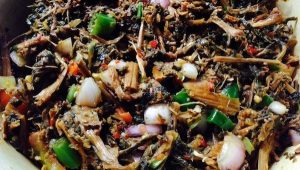Top ten immune booster foods found locally in Nepal
In this emergency situation everyone is talking about COVID-19 and social distancing. Everyone is terrified but we are all forgetting basic concept i.e., prevention is better than cure. We always had been hit with emergency situation at different intervals of time. Whatever the disease it be, it’s consequences can be decreased with healthy lifestyle. We now are returning back to the era where food was taken not to just fill our tummy but as medicine too.
We take antibiotics during a viral fever so that the bacteria that are present in our body will not harm back. This condition is called secondary infection and mostly prevalent in HIV infected patients. Along with medicine it is equally important to have food that provides us energy to fight against diseases and to heal our cells that are damaged. This is called as increasing immunity through intake of such immune booster foods. In our body we have many cells that acts as barrier to wide range of pathogens. These cells are called immune cells which at first prevents pathogens from entering our body or provide tolerance if pathogens enter. These cells then provide immunity if same pathogen enters again, if not develop new system if new one enters. In this way we maintain our own defense mechanism through these cells. So, it is equally important to keep these cells healthy so that it can keep fighting to protect us. If we are strong within (both physically and mentally) we can combat many diseases. Here we tried to list some foods that we can find easily in local markets that helps us to boost our immune system:
- Mushrooms

They are in our top priority list because all of the essential components required for boosting immunity of our body are present. They have almost all essential amino acids (build and repair cells), rich in protein (substitute to meat/soya products), vitamins (B1, B2, B12, C, D and E), potassium, selenium and also are cholesterol-free. They have antibacterial, anti- cancerous, anti-tumorigenic properties. Sun dried mushrooms have more vitamin D than fresh mushrooms. There is easier way of getting Vitamin D without sun bathing. Apart from promoting bone/teeth health recent studies shows VitD also support immune, brain and nervous system health. We can take benefit from any mushroom found in local market like Oyster, Button or Shitake. Oyster and Shitake mushroom are grown organically so has more health benefits. Mushrooms supports lung function too which is really helpful to fight against flu causing viruses.
- Ginger, Garlic and Turmeric

Reason why we kept 3 of them in a single list is we Nepalese take them in combination while preparing our vegetable dish. There is a step by step process followed by logic of keeping these ingredients while preparing them. Science behind placing turmeric in oil is it forms nanoparticles with oil and when it combines with vegetable these nanoparticles can travel through blood stream to every part of the body. Ginger and garlic paste are also added along with the turmeric. The essential oils of ginger and garlic gets mixed with the cooking oil and taken to blood stream along with nanoparticles. Curcumin of turmeric, gingerol of ginger has anti-inflammatory function.
- Citrus fruits

We still can find some oranges and Broccoli in these seasons which is good to go. We can enjoy Oranges either raw or our method of eating it with some spicy seasoning. Lemons can be used in salads or hot lemon drink either plain or with honey or ginger in it. Citrus foods are rich in Vitamin C which helps to build our white blood cells. Flavonoids and essential oils act as anticancer, anti-inflammatory, antiviral, antibacterial and antifungal.
- Broccoli

Broccoli contains multiple nutrients. They have significant amount of VitC (55% per 100gm) and 3,3-di-indodylmethane which are potent modulator of immune system with anti-viral, anti-bacterial and anti-cancer activity. They also have small amounts of selenium, isothiocyanates (potent anti-carcinogens), dietary fibers and even calcium content is equivalent to that present in milk (47mg/100gm). Broccoli normalizes blood sugar level, activates enzymes for detoxification that leads to prevention of certain diseases. Intake of raw broccoli 3 servings per month has reduced bladder cancer by 40%. 3 days old broccoli sprouts contain at least 20 times as much as disease fighting Sulphoraphane Glucosinolate (SGS) than mature broccoli.
- Green tea

Green tea contains polyphenols (30% of dry weight) including flavonoids, flavanols and phenolic acids, amino acids (1-4%), carbohydrates (5-7%), trace elements (5%), vitamins and caffeine (0.4-10%). Their consumption has been linked with protection from degenerative diseases, as anti-tumorigenic, anti-carcinogenic and immune modulators. Their extracts are more potent found to be effective in preventing neurological problems and oxidative stress. Proportion of polyphenols present in extracts are very high which may vary from 45-90%. Catechins present in tea and extracts help to reduce body weight by fat oxidation. It is to be noted that intake of green tea should be maintained. Green tea is not recommended for patients suffering from heart conditions. No more than one to two cups per day is recommended for pregnant and breast-feeding women.
- Yoghurt
 Yoghurt being fermented product contain an immense variety of bioactive compounds like VitB12, calcium, magnesium, proteins and peptides. Matrix of milk is altered to yoghurt by fermentation process which result in longer gastrointestinal transit time enhancing absorption of nutrients and reducing gastrointestinal disturbances. Yoghurt is a source of probiotics (has live-health promoting bacterial and yeast strain). Colonization by these micro-organisms in gastrointestinal (GI) tract along with gut microbes creates barrier between environment and individual protecting against disease. This process also provides synergistic effect. Yoghurt consumed along with fruits has additional benefits. Fruits have prebiotic properties which are 100% transferrable to colon which helps modulating microbiota. Mixture of probiotics and prebiotics provides live microbial dietary supplement which stimulates immune function by promoting growth of healthy bacteria and inhibiting pathogenic bacteria in the GI tract. General serving of 125-250ml yoghurt is recommended with banana, raspberry or cranberry in combination with meals or snacks.
Yoghurt being fermented product contain an immense variety of bioactive compounds like VitB12, calcium, magnesium, proteins and peptides. Matrix of milk is altered to yoghurt by fermentation process which result in longer gastrointestinal transit time enhancing absorption of nutrients and reducing gastrointestinal disturbances. Yoghurt is a source of probiotics (has live-health promoting bacterial and yeast strain). Colonization by these micro-organisms in gastrointestinal (GI) tract along with gut microbes creates barrier between environment and individual protecting against disease. This process also provides synergistic effect. Yoghurt consumed along with fruits has additional benefits. Fruits have prebiotic properties which are 100% transferrable to colon which helps modulating microbiota. Mixture of probiotics and prebiotics provides live microbial dietary supplement which stimulates immune function by promoting growth of healthy bacteria and inhibiting pathogenic bacteria in the GI tract. General serving of 125-250ml yoghurt is recommended with banana, raspberry or cranberry in combination with meals or snacks.
- Carrot
 A root vegetable carrot has remarkable nutritional and health benefits. They are ranked 10th among 39 fruits and vegetables in nutritional value. The main popularity comes from presence of high provitamin A content. Other elements include antioxidants (carotenoids and anthocyanins), dietary fiber, magnesium, manganese and molybdenum, rarely found in vegetables. Carotenoids have anti-carcinogenic effect. Carrot extract has shown immunomodulatory effect. The a- and b-carotenoids were responsible for increase in number of immune cells like lymphocytes, monocytes, eosinophils and platelet concentration. Experimental study reported anti-inflammatory, anti-bacterial, anti-fungal, wound healing and analgesic properties in carrot seed essential oils and extracts.
A root vegetable carrot has remarkable nutritional and health benefits. They are ranked 10th among 39 fruits and vegetables in nutritional value. The main popularity comes from presence of high provitamin A content. Other elements include antioxidants (carotenoids and anthocyanins), dietary fiber, magnesium, manganese and molybdenum, rarely found in vegetables. Carotenoids have anti-carcinogenic effect. Carrot extract has shown immunomodulatory effect. The a- and b-carotenoids were responsible for increase in number of immune cells like lymphocytes, monocytes, eosinophils and platelet concentration. Experimental study reported anti-inflammatory, anti-bacterial, anti-fungal, wound healing and analgesic properties in carrot seed essential oils and extracts.
- Kiwi
 Recently kiwi fruit has owned human attention through its contribution to digestive health providing functional and metabolic benefits. They are high in Vitamin C and E, potassium, folate, antioxidants, phytonutrients and dietary fibres. Their regular consumption improves digestive, immune and metabolic health. Kiwi can improve iron bioavailability. For women eating kiwi with iron-fortified breakfast is beneficial. During pregnancy kiwi fruit can easily contribute to meet requirement of folate, potassium and Vitamin E. Recent studies have shown promising result on group considered to be risk of immunosuppression (e.g., older adults, individual exposed to ultraviolet radiation or stress condition). Severity and duration of upper respiratory infection symptoms was reduced upon consumption of four kiwifruit per day for four weeks tested in 32 elderly people. Eating two kiwi fruit per day is enough to reach healthy level of plasma Vitamin C.
Recently kiwi fruit has owned human attention through its contribution to digestive health providing functional and metabolic benefits. They are high in Vitamin C and E, potassium, folate, antioxidants, phytonutrients and dietary fibres. Their regular consumption improves digestive, immune and metabolic health. Kiwi can improve iron bioavailability. For women eating kiwi with iron-fortified breakfast is beneficial. During pregnancy kiwi fruit can easily contribute to meet requirement of folate, potassium and Vitamin E. Recent studies have shown promising result on group considered to be risk of immunosuppression (e.g., older adults, individual exposed to ultraviolet radiation or stress condition). Severity and duration of upper respiratory infection symptoms was reduced upon consumption of four kiwifruit per day for four weeks tested in 32 elderly people. Eating two kiwi fruit per day is enough to reach healthy level of plasma Vitamin C.
- Fish
 Fish has always been excellent source of omega-3 fatty acid and low-fat protein. Daily intake of n-3 PUFA decreases rate of cardiovascular disease. For healthy people it is recommended to consume fatty fish at least twice a week (30-40g/day). Fat, proteins, vitamins and minerals present in fish work in combination and is complex. However, they help to promote blood, heart, retina and brain function in growing children, adolescent and elderly people. Taurine, a free amino acid has important role such as anti-oxidation, calcium modulation, bile acid conjugation, membrane solubilization and immunity.
Fish has always been excellent source of omega-3 fatty acid and low-fat protein. Daily intake of n-3 PUFA decreases rate of cardiovascular disease. For healthy people it is recommended to consume fatty fish at least twice a week (30-40g/day). Fat, proteins, vitamins and minerals present in fish work in combination and is complex. However, they help to promote blood, heart, retina and brain function in growing children, adolescent and elderly people. Taurine, a free amino acid has important role such as anti-oxidation, calcium modulation, bile acid conjugation, membrane solubilization and immunity.
- Gundruk:
 Last but not the least we have our own variety of fermented product which has proven facts it contains Vitamin B12. They act as probiotics rich in Lactic acid bacteria as yoghurt which keeps out gut healthy boosting our immune system. They are also rich in fiber, iron and phytochemicals believed to have cancer fighting properties. Gundruk doesn’t have added salt, which provides additional benefit to it from Sauerkraut and Kimchi. It can be enjoyed by diverse group of people even by people having high blood pressure.
Last but not the least we have our own variety of fermented product which has proven facts it contains Vitamin B12. They act as probiotics rich in Lactic acid bacteria as yoghurt which keeps out gut healthy boosting our immune system. They are also rich in fiber, iron and phytochemicals believed to have cancer fighting properties. Gundruk doesn’t have added salt, which provides additional benefit to it from Sauerkraut and Kimchi. It can be enjoyed by diverse group of people even by people having high blood pressure.
Take away
Eating nutritious food alone cannot assure us good health. Being mentally healthy is equally important for balance life. Pay attention to your personnel hygiene. Try to eat fresh. The nutritional value of food depends upon how it is grown and processed. It’s always good to eat food in right quantity otherwise it can bring negative function. Be responsible for what you eat and grow.
References:
- Stamets,P. (2000). Growing Gourmet and Medicinal Mushrooms.
- Mashhadi, N. S., Ghiasvand, R., Askari, G., Hariri, M., Darvishi, L., & Mofid, M. R. (2013). Anti-oxidative and anti-inflammatory effects of ginger in health and physical activity: review of current evidence. International journal of preventive medicine, 4(Suppl 1), S36–S42.
- Hewlings, S. J., & Kalman, D. S. (2017). Curcumin: A Review of Its' Effects on Human Health. Foods (Basel, Switzerland), 6(10), 92. https://doi.org/10.3390/foods6100092
- Griffiths,G., Trueman.L., Crowther,T., Thomas,B., & Smith,B.(2002). Onions- A global benefit to health.
- Fouad Abobatta, W. (2019). Nutritional Benefits of Citrus Fruits. American Journal of Biomedical Science & Research, 3(4), 303–306. doi:10.34297/ajbsr.2019.03.000681
- Mukherjee, Voomika & Mishra, Prashant Kumar. (2012). BROCCOLI-AN UNDEREXPLOITED NEUTRACEUTICAL.
- Chacko, S. M., Thambi, P. T., Kuttan, R., & Nishigaki, I. (2010). Beneficial effects of green tea: a literature review. Chinese medicine, 5, 13. https://doi.org/10.1186/1749-8546-5-13
- Fernandez, M. A., & Marette, A. (2017). Potential Health Benefits of Combining Yogurt and Fruits Based on Their Probiotic and Prebiotic Properties. Advances in nutrition (Bethesda, Md.), 8(1), 155S–164S. https://doi.org/10.3945/an.115.011114
- Dias, João. (2014). Nutritional and Health Benefits of Carrots and Their Seed Extracts. Food and Nutrition Sciences. 05. 2147-2156. 10.4236/fns.2014.522227.
- Richardson, D. P., Ansell, J., & Drummond, L. N. (2018). The nutritional and health attributes of kiwifruit: a review. European journal of nutrition, 57(8), 2659–2676. https://doi.org/10.1007/s00394-018-1627-z
- Hosomi, R., Yoshida, M., & Fukunaga, K. (2012). Seafood consumption and components for health. Global journal of health science, 4(3), 72–86. https://doi.org/10.5539/gjhs.v4n3p72
Article by:
Sumeena Karki
Ms.c Biotechnology, Tribhuvan University